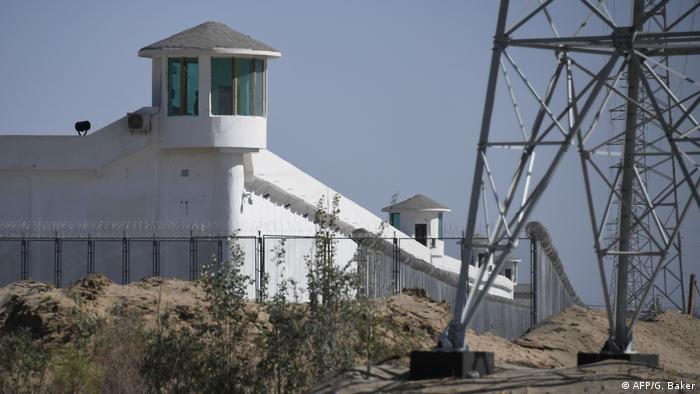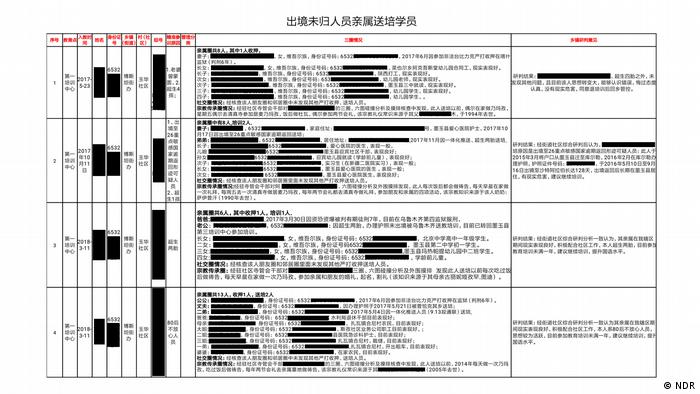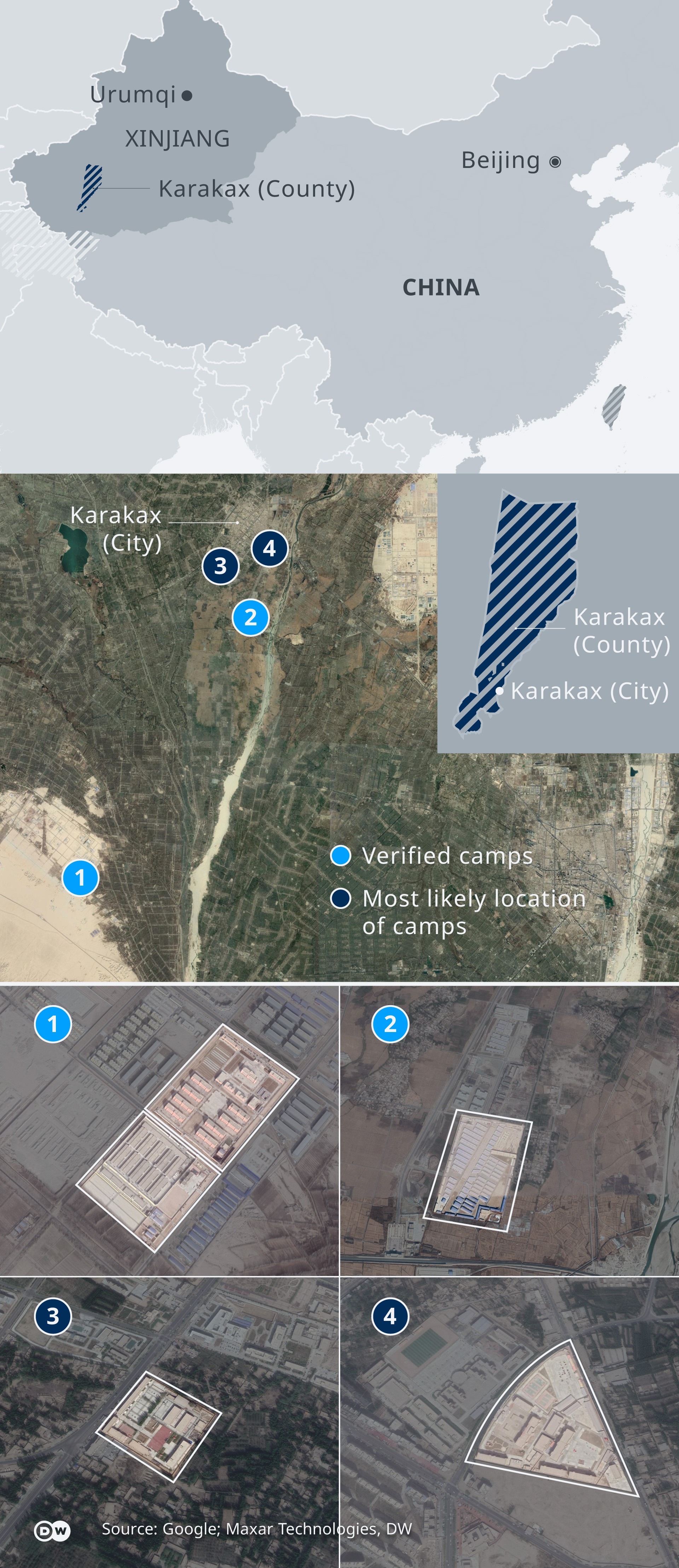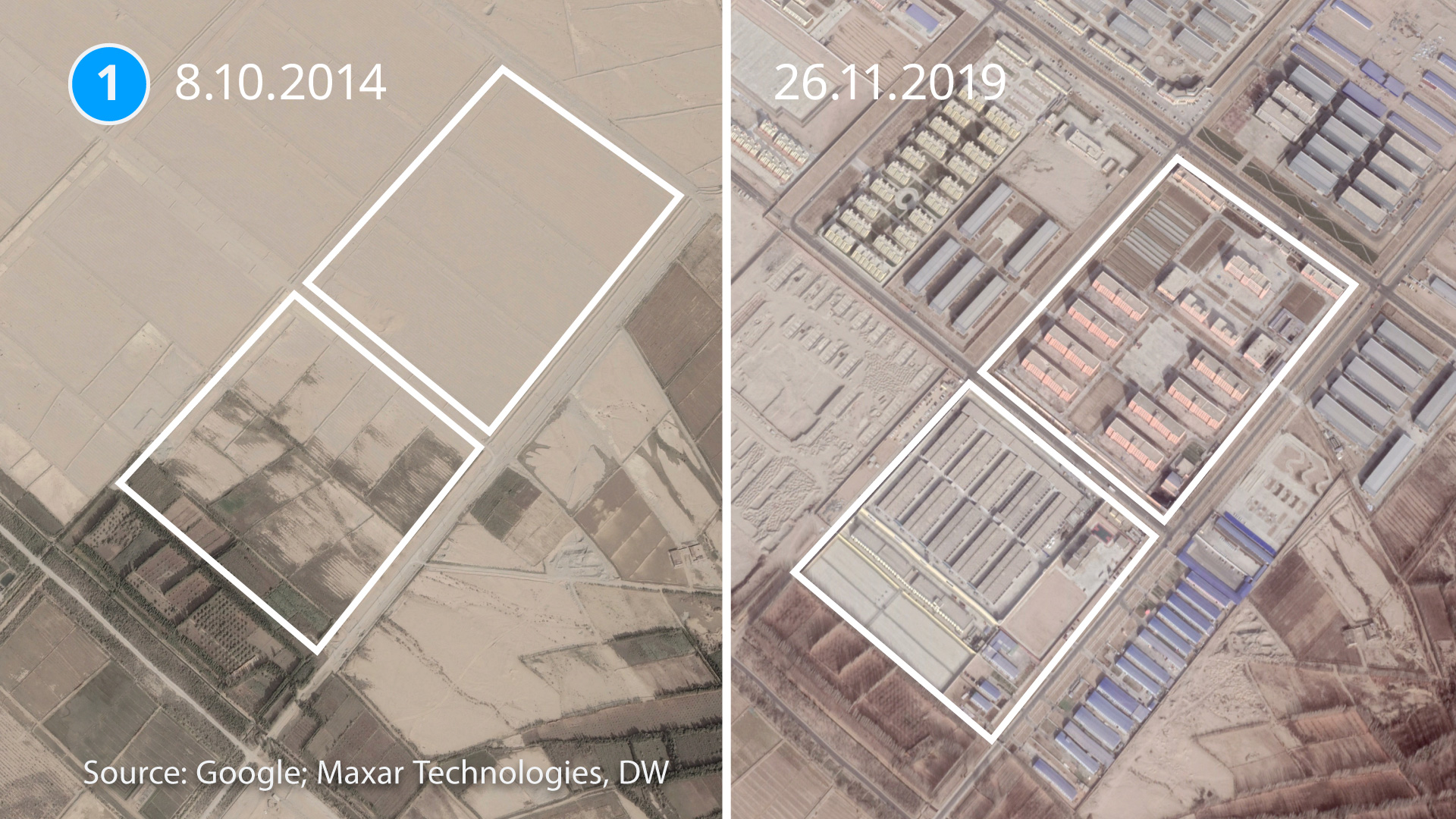DW INVESTIGATES
Exclusive: China's systematic tracking, arrests of Uighurs exposed in new Xinjiang leak

A 'Vocational Education Training Center' in Xinjiang, China with watchtowers, walls, fences and barbed wire
An official list of detainees shows how Beijing is tracking every face, every family and every movement of Muslim minority Uighurs in Xinjiang. People have been arrested for growing beards and having "too many" children.
In May 2017, a Uighur man was taken away to a "re-education camp" in China's northwestern Xinjiang region. As an observant Muslim, the man prayed at home after meals, and sometimes attended Friday prayers at his local mosque. The reasons for his forced internment: His wife had covered her face with a veil and the couple had "too many" children. There was never a trial.
According to a newly leaked document from Xinjiang, the man underwent a "great ideological transformation" in the camp and "realized his mistakes and showed good repentance." The family's four boys and two girls back at home all demonstrated "good behavior."
In June 2017, however, their mother was sent to prison for six years. She was charged with participating in an "illegal religious activity."
This family's story is similar to hundreds of cases, which are listed in unprecedented detail.
The leak provides information on why people are detained, while revealing that Chinese authorities are using high-tech surveillance and sheer manpower to keep track of identities, locations and habits of individual Uighur Muslims.
The list of detainees records the fate of 311 people who were sent off to "re-education" for the most innocuous things: growing a beard, fasting, or applying for a passport.
All of them were put in internment camps in 2017 and 2018. The document also lists hundreds of other people connected to them, including children.
DW, together with German broadcasters NDR and WDR and the newspaper Süddeutsche Zeitung, spent weeks translating the document and analyzing the data.

The first of the 137-page Chinese document leaked to DW and German media partners
China's Xinjiang crackdown goes under the microscope
After a suicide bombing struck Xinjiang's capital city in May 2014, Chinese authorities installed a system of surveillance and mass-detention centers. The Chinese Communist Party officially calls them voluntary "Vocational Education Training Centers." According to estimates, at least 1 million of the roughly 10 million Uighurs living in Xinjiang have disappeared into these centers.
In a confidential report compiled in December 2019 by the German Foreign Office, the centers are referred to as being "effectively re-education camps" with "draconian ideological training courses."
China claims that "the training centers" are an effective tool in a fight against Islamist terrorism.
However, contrary to the official line from Beijing, there is almost no indication in this latest document leak that Chinese authorities in Xinjiang are targeting potential terrorists.
Although three listed people are suspected to be members of an Islamist organization, above all, the document shows that any expression of Islamic religious piety potentially amounts to a crime.

The analysis of the document by DW and its partners paints a picture of what many international human rights observers fear is a systematic campaign of ethnic profiling and arbitrary imprisonment outside the rule of law.
The list is 137 pages long and keeps track of minor details, such as videos someone downloaded some six years ago or WeChat messages that were exchanged with friends abroad.
Analysis shows how Uighurs are subjected to draconian methods of tracking and arrest. Facial recognition is carried out with high-tech surveillance cameras. Individual Uighur families are constantly monitored through a network of spies, repeated house visits and collective interrogations.
The document lists the full names, identification numbers and social behavior of more than 1,800 family members, neighbors and friends connected to the 311 main detainees. Hundreds more are listed in lesser detail. The Chinese state employs large numbers of staff to collect detailed data about each Uighur household.
Verifying the Karakax list
The cases listed are all centered on one region: Karakax County, in Xinjiang's southwestern Hotan prefecture bordering India and Tibet. There are at least five official "vocational training centers" in Karakax County for a population of less than 650,000 people.
The list of detainees mentions four of them. DW was able to verify and locate two of these internment camps using satellite images and government documents. DW was also able to track the likely location of two other camps, using the same methodology.

A satellite image of the first of four camps mentioned in the list from Karakax
DW was tipped off about the new document in November 2019 by whistleblower Abduweli Ayup, an exiled Uighur academic currently living in Norway.
Ayup received the PDF spreadsheet from a source whose identity and whereabouts have to remain anonymous for security reasons.
The new leak doesn't have an official stamp or signature. But its language is similar to other leaks from last year. In November 2019, the "Xinjiang Papers" were published by The New York Times, and the "China Cables" were published by the International Consortium of Investigative Journalists.
Both reports revealed the overall scale of Beijing's stranglehold on the Uighur community in northwestern China. This new document specifically outlines the reasons for internment and provides a closer look at Uighurs' day-to-day reality of living under systematic surveillance.
DW was able to contact family members of detained Uighurs and consulted experts to verify the information in the document. A woman DW met in Istanbul, Rozinisa Memet Tohti, learned through the list that her youngest sister had also been sent to a camp.
The case details show that 15 relatives are closely monitored. However, they are described as "behaving nicely," and all are "actively participating" in daily community service. Therefore, the official recommendation is that the man be sent back to his community for "further surveillance."
Rian Thum, an expert on China's Uighur policy at the University of Nottingham, told DW that the monitoring of people's private lives "is overwhelming" in its level of detail. "I think it is interesting to imagine that these things exist across Xinjiang. The data that is out there must be staggering."
Forced labor in factories
The fate of Uighurs in the camps also depend on the actions of those on the outside. In some cases, the conduct of family members is used as a direct reference on whether an interned Uighur can be "released."
About two-thirds of the detainees listed were earmarked for release, only to be kept under continuous surveillance, with their freedom of movement strictly curtailed.
In dozens of cases, DW has found reference to a system of forced labor in factories.
One such case of prolonged internment at a factory involves a man detained in May 2018 for contacting his brother, who had fled to Turkey.
According to the document, the detainee therefore "poses a certain level of danger to society." The recommendation by the "community" is for him to "remain in a factory in the re-education camps."
'Illegal' babies
However, the top cause for arrest of Uighurs from Karakax County was violating China's official birth control policy by having too many babies.
According to family planning law, Uighurs and other minorities in urban areas are allowed two children, whereas Uighurs in rural areas are allowed three.
And the numbers clearly show that considerably more men than women were interned for violating this family planning law.
The disparity could indicate that the Chinese government considers Uighur men as the primary threat to its control over Xinjiang.
"I think in terms of Islamophobia, men in general, especially young men, are always the targets and seen as potential terrorists," Xinjiang expert Darren Byler of the University of Colorado told DW.
"My feeling is that the government wants to weaken or diminish the Uighur population as a way of reducing the threat perception."
DW's analysis also shows that the Chinese state specifically targets the younger generation. In the document, the term "worrisome person" or "untrustworthy person" is used for people born between 1980 and 2000.
More than 60% of internees are between 20 and 40 years old. "This has major implications for demographics and the birth rate," said analyst Thum from the University of Nottingham. "If you take a portion — or even the entirety — of a village's youth, you basically put a pause" on the community's growth.
'Criminal' contacts abroad
Dozens of people listed in the document were arrested for being friends with "a suspicious figure living overseas," or for going on an Islamic pilgrimage, like the Hajj to Mecca.
In roughly 40 cases, people were also arrested after they applied for a passport.
Chinese authorities have officially deemed 26 countries as "sensitive." Almost all of them are Muslim-majority, such as Algeria, Pakistan and Saudi Arabia. Any contact with these places is grounds for detention if you are Uighur in Xinjiang.
This list of "sensitive countries" also includes China's central Asian neighbors like Kazakhstan, where many Uighurs have family and friends, along with cultural and ethnic ties.
"If the Chinese Communist Party is able to completely eliminate the influence of Islam from all elements of Uighur life, then Uighur culture will certainly be hollowed out," said Timothy Grose, a Xinjiang scholar at the Rose Hulman Institute of Technology in the US.
This is exemplified by the destruction of mosques and Muslim cemeteries in the region.
Is Islam 'illegal' in China?
Experts believe that Beijing's endgame is to uproot Uighurs and other Muslim minorities in Xinjiang from their religion and cultural heritage. Muslims are prohibited from practicing any normal forms of Islam to force them to assimilate into "mainstream" Chinese society.
In one case, a young man was detained because he did not keep his restaurant open "at normal times" during the fasting period of Ramadan, the holiest time of the year in Islamic culture.
The document originally described this detainee as a person who "is easily influenced by extremist thoughts."
The young man has since been released and was put under surveillance at home. According to local authorities, he currently "does not take part in illegal religious activities" and actively participates in community work. His "attitude has changed considerably" and he is "able to see his mistakes and sincerely repents."
In a recent interview with DW and its partners during a visit to Berlin, China's Foreign Minister Wang Yi said that any reports about any kind of "concentration camps" for Uighurs are "completely fake news" designed to harm China's development. He added that "there is no persecution in Xinjiang."
DW's Naomi Conrad, Cherie Chan, Julia Bayer, Mathias Stamm and Wesley Rahn contributed to this report.
https://www.aljazeera.com/indepth/opinion/don-forget-uighur-coronavirus-crisis-200214134600562.html?fbclid=IwAR2c5n23u0nkDCWhBSzINjC0J5AnD8cwJTrk7ZWf1z7B7_4XJLPM0XSHgOk
ReplyDeleteClaude Baesens Surprised to see you advertising this AJ propaganda piece.
Delete or hide this
Like
· Reply · 13h
Tim Veater
Tim Veater Not sure what you mean Claude. The mistreatment and mass 'reeducation' of Muslims by China is surely an humanitarian issue of importance. Whether it is connected in some way to the Corona virus epidemic is of course another matter.
Edit or delete this
Like
· Reply · 10h
Claude Baesens
Claude Baesens For a number of years now the CIA and other agencies have been recruiting Uighurs to perform terrorist acts and destabilise China. They are also sent to Syria as mercenaries against the government. As for Syria, I am not sure you can rely on Al Jazeera on this topic. There is a lot of propaganda in the Western media about the "Uighur plight" (same as for Syria) but Western people who go on fact finding missions bring back a very different story, for instance Cynthia McKinney who brought a group of Americans and British (e.g. Elleanne Green) to China specifically to visit the Xinjiang region where the Uighur live.
Delete or hide this
Like
· Reply · 8h
Tim Veater
Tim Veater I accept you general point Claude but this looks pretty convincing: https://www.dw.com/.../exclusive-chinas.../a-52397824
Edit or delete this
Exclusive: China's systematic tracking, arrests of Uighurs exposed in new Xinjiang leak | DW | 17.02.2020
DW.COM
Exclusive: China's systematic tracking, arrests of Uighurs…
Exclusive: China's systematic tracking, arrests of Uighurs exposed in new Xinjiang leak | DW | 17.02.2020
Like
· Reply · Remove Preview · 18m
Tim Veater
Tim Veater As we saw with the israeli/Saudi/American (with a little help from their European friends) created the ISIS bogey man from virtually nothing, and used it to justify its action against Syria and Iran (a repeat of the 9/11 fraud) so I don't doubt it could be behind the unrest and propaganda involving the Uighurs. However the inhuman way in which China reacts to it, if true, should not be beyond examination and reproach if deserved, as with every other nation.
Claude Baesens I am afraid I am not quite convinced by your piece above but unfortunately I don't read Mandarin so can't checked the "leaked documents". Have you watched the included interview of Victor Gao by Tim Sebastian? After spending five weeks in China (for work, giving talks/ mini courses in various places + some tourism, but not Xinjiang) I came back very impressed by China and I quite agree with what Victor Gao is saying. (Incidentally, my 'base camp' where I spent more than two weeks in total was Wuhan! now famous with the coronavirus). Now we might not agree with all of China policies, that we might find to be "against human rights" (e.g. one child per family that was law until a few years ago (and indeed all PhD students I met were single children)) so it is clear that the state of China has different laws and is not as liberal as we are, for instance. The State in China is hugely important but the Chinese like that: they are very proud of their country and think much more in terms of the general good / interest of the country than individual interests. So they are happy to follow what the State proposes. Now what the Chinese government has achieved in the last 20 - 30 years is truly amazing, in my view. Now we don't have the same values. For instance the Chinese much respect their elders and see it as a duty to look after them so they are truly shocked if you tell them that here older people are put in care houses and not looked after by their family. When I see Julian Assange in solitary confinement in Belmarsh with no charges when he should be free, I think that Britain does not have any moral right to lecture China about human rights. When we will stop intervening in the world to foment unrest (like in Hong Kong) and regime changes, I'll take more seriously what we say about human right violations in these countries.
ReplyDeleteDelete or hide this
Like
· Reply · 2h
Tim Veater
Tim Veater Agree with your point about right to lecture other countries. The old adage of mote in your own eye first. But how the Cambridge intellectuals loved the USSR whilst thousands, nay millions were dispatched with just a wink fro 'Uncle Joe' and millions were sacrificed to Mao's 'Cultural Revolution' and that 1991 Nobel Peace Prize winner Aung San Suu Kyi cannot find the words to condemn the slaughter of innocents. Very few nations have a clean slate. They contain both good and bad. We all need to retain the ability to see the one without avoiding - or excusing - the other.